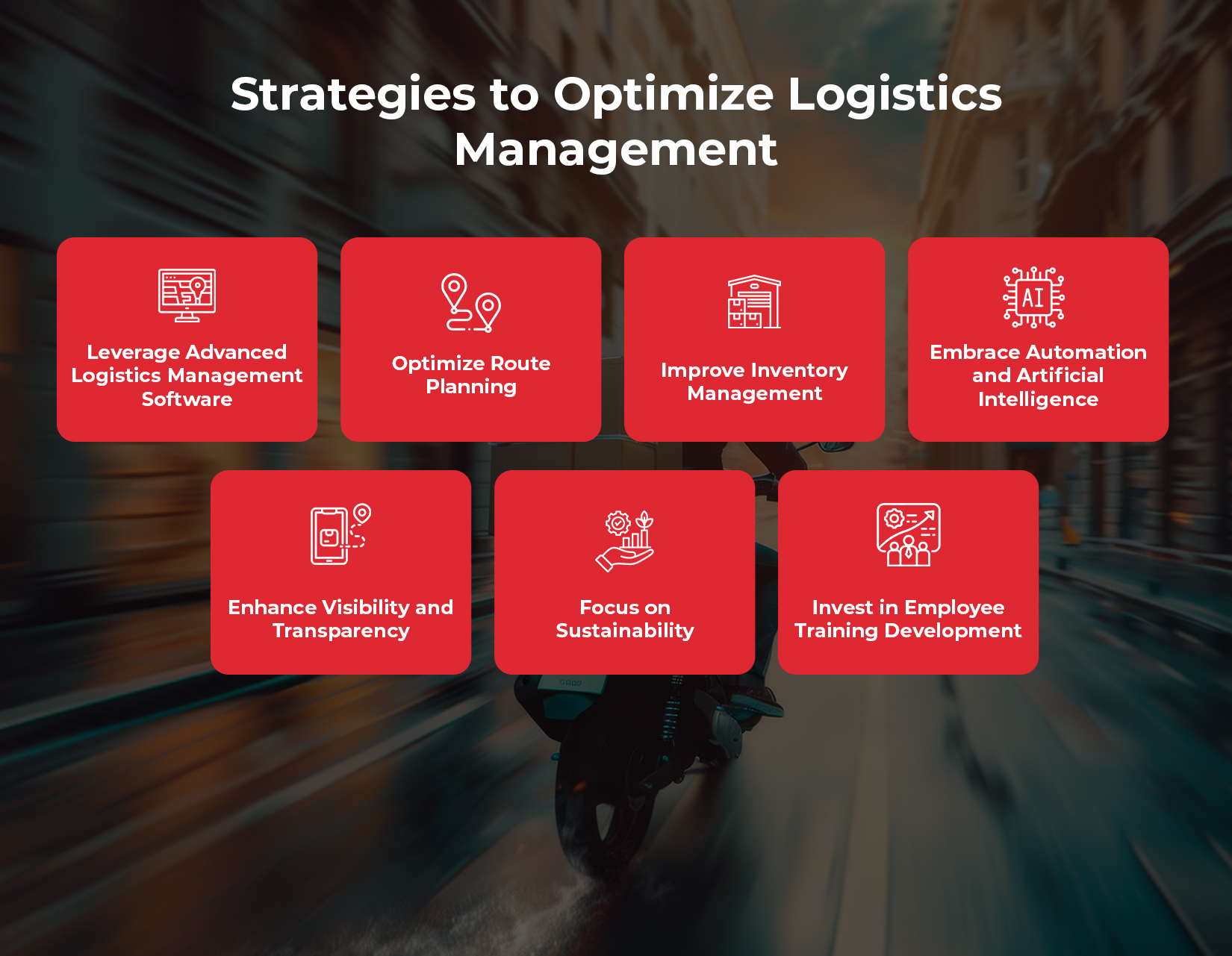
Speed Up Your Service: Proven Strategies to Optimize Logistics Management
In today’s competitive landscape, efficient logistics management is key to delivering exceptional service and staying ahead of the curve. Logistics management software plays a pivotal role in streamlining operations, reducing costs, and enhancing customer satisfaction. This blog explores proven strategies to optimize logistics management, leveraging the best logistics software and innovative solutions.
7 Proven Strategies to Optimize Logistics Management

1. Leverage Advanced Logistics Management Software:
Adopting advanced logistics management software such as LogiNext Mile is essential for businesses seeking to optimize their supply chain operations. Modern software offers a range of features that automate processes, such as route planning, inventory management, and real-time tracking. These tools help businesses save time, reduce operational costs, and improve service levels.
For example, companies using logistics software solutions can automate routine tasks, minimize human error, and enhance decision-making capabilities. According to a 2023 survey by Logistics Management Magazine, 67% of businesses reported a significant improvement in their logistics efficiency after implementing the software. This software is designed to handle various logistics functions, offering a comprehensive solution for businesses of all sizes.
2. Optimize Route Planning:
Route planning is a critical component of logistics management. Effective route optimization can significantly reduce delivery times and fuel costs, contributing to a more efficient supply chain. Utilizing a software with advanced route planning capabilities ensures that businesses can plan the most efficient routes based on real-time traffic data, weather conditions, and delivery windows.
A study by Gartner shows that companies using route optimization software can reduce fuel consumption by up to 30% and cut delivery times by 15% . These savings translate directly into improved profitability and customer satisfaction, as timely deliveries enhance the overall customer experience.
3. Improve Inventory Management:
Efficient inventory management is another key aspect of optimizing logistics management. With useful solutions, businesses can gain real-time visibility into inventory levels, reducing the risk of stockouts and overstock situations. Inventory management tools within logistics software solutions help automate the replenishment process, ensuring optimal stock levels are maintained at all times.
A study by the National Retail Federation in 2023 found that businesses using advanced inventory management systems saw a 25% reduction in inventory holding costs. These solutions also enable businesses to forecast demand more accurately, align inventory levels with market trends, and reduce waste, leading to substantial cost savings.
4. Embrace Automation and Artificial Intelligence:
Automation and artificial intelligence (AI) are transforming the logistics industry. By integrating AI into the software, businesses can automate order processing and inventory tracking, and make data-driven decisions. AI-powered logistics software solutions can analyze vast amounts of data to identify patterns and predict demand, helping businesses stay ahead of market trends.
For instance, AI algorithms can optimize warehouse layouts to reduce picking times or predict potential disruptions in the supply chain. According to McKinsey & Company, businesses that have integrated AI into their logistics management processes have seen a 15-20% reduction in costs. This demonstrates the significant impact of automation and AI on logistics efficiency and service quality.
5. Enhance Visibility and Transparency:
Visibility is crucial for effective logistics management. Customers expect real-time updates on their orders, and businesses need transparency to manage their supply chains efficiently. Logistics management software provides end-to-end visibility, enabling businesses to track shipments in real time, monitor inventory levels, and manage delivery schedules.
Enhanced visibility not only improves customer satisfaction but allows businesses to quickly identify and resolve potential issues in the supply chain. According to a 2023 report by Deloitte, 73% of companies with high supply chain visibility reported better customer retention rates and increased profitability. Using software ensures that businesses can meet these visibility demands, providing a seamless customer experience.
6. Focus on Sustainability:
Sustainability is becoming increasingly important in logistics management. Customers and stakeholders are demanding greener practices, and businesses need to respond accordingly. A useful software can help businesses optimize their operations for sustainability by reducing fuel consumption, minimizing waste, and optimizing routes.
Implementing sustainable practices not only benefits the environment but also enhances a company’s reputation and bottom line. Research from the World Economic Forum in 2024 found that companies with strong sustainability practices saw a 12% increase in customer loyalty. By using a software to monitor and reduce their carbon footprint, businesses can achieve both environmental and financial gains.
7. Invest in Employee Training and Development:
While technology plays a vital role in optimizing logistics management, human resources remain a critical factor. Investing in employee training ensures that staff are proficient in using the software and other digital tools. Well-trained employees can better manage logistics processes, resolve issues more effectively, and contribute to a smoother supply chain.
According to a survey by the Council of Supply Chain Management Professionals (CSCMP), businesses that invested in employee training reported a 20% increase in logistics efficiency. Training programs should focus on equipping staff with the skills needed to utilize solutions fully, from software to advanced analytics tools.
Conclusion
Optimizing logistics management is crucial for businesses looking to enhance their service delivery and gain a competitive edge. By leveraging advanced software, optimizing route planning, improving inventory management, embracing automation, enhancing visibility, focusing on sustainability, and investing in employee training, businesses can achieve significant improvements in their logistics operations.
Adopting these strategies not only helps businesses reduce costs and improve efficiency but also enhances customer satisfaction and loyalty. As the logistics landscape continues to evolve, businesses that prioritize optimizing their logistics management processes will be well-positioned to succeed in a competitive market. By integrating LogiNext Mile’s logistics management software and leveraging the best logistics software available, businesses can stay ahead of the curve and deliver exceptional service to their customers. Click on the red button and book a demo to optimize your logistics with LogiNext Mile.
56







@LogiNext